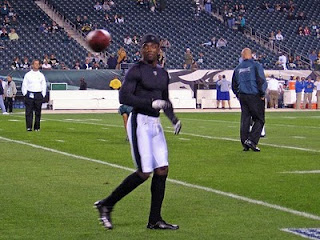Earlier this week, the Baltimore Ravens signed free agent wide receiver Donte' Stallworth to a one-year contract worth $900,000. Generally, a Ravens fan would have two possible gut reactions to seeing that news crawl across the ESPN Bottom Line (or a similar news ticker):
A) That's good! He's gives the Ravens some speed that they currently lack at that position, and the Ravens need that desperately.
B) What? Wasn't he suspended this whole year for killing somebody?
Neither reaction is incorrect. Stallworth automatically becomes the fastest wideout on the roster and has the potential to improve quarterback Joe Flacco's deeper passes so that he can worry more about being accurate on a given throw than overshooting his target. Stallworth also hasn't shown that speed in over a year - last March, he was charged with vehicular manslaughter after killing a pedestrian while driving under the influence of alcohol, and he was consequently suspended for the 2009 season by the NFL.
The shrewd part of this signing is in the facts and figures: Stallworth's contract is pretty low for a veteran (mostly due to his undesirable status as a criminal), and he has shown that he can produce solid numbers for a No. 2 receiver, catching 70 passes for 945 yards and 7 touchdowns in 2005 for the New Orleans Saints. Economically speaking, that sounds like a low-risk and potentially high-reward acquisition.
The more important aspects of this signing are, unfortunately, a lot less measurable. The intangibles of the Stallworth signing make up a veritable powder keg of negative publicity that could really hurt Baltimore if he doesn't play a considerable role in the offense in 2010. For one, the fact that he signed with the Ravens perpetuates Baltimore's "thug" reputation among the rest of the NFL. The stream of off-field incidents involving Cincinnati Bengals players in recent years has helped divert attention from the Ravens, but they have yet to really shake the "bad boy" label, one that they have been desperately trying to erase in the wake of investigations involving Ray Lewis and Jamal Lewis earlier this decade. The "second chance" philosophy that owner Steve Bisciotti stands by is admirable, but at the moment, it may not be great for business.
The larger issue at play, however, is the direction the Ravens' front office is taking in remaking the receiving corps to better complement Flacco's development as (hopefully) a franchise quarterback. The need for a dynamic No. 1 wide receiver has been staring GM Ozzie Newsome and director of player personnel Eric DeCosta in the face for quite some time now (nearly two calendar years), and in that time, they have yet to make a significant move to take the pressure off a solid-but-aging Derrick Mason. Signing Stallworth is no more an improvement to the offense than was the signing of Kelley Washington from among a group of ho-hum candidates who worked out for the Ravens last May. At best, it's incremental progress for a team that needs serious receiving talent as quickly as they can get it.
How is this year's situation any different from last year? Fans are sharing the same whispered rumors about Anquan Boldin and Brandon Marshall today that they ooh-ed and ahh-ed about before last year's draft. It's clear that Newsome and Decosta are not willing to part with high draft picks or shell out considerable cash to sign a free agent receiver, and neither one of those reservations is necessarily a bad thing. On the other hand, limiting the team's acquisitions primarily to the NFL draft is risky and shrinks the pool of talent considerably.
Given Flacco's success in the passing game this season (3,613 yards, 21 TDs, 12 INTs), some might say that the Ravens don't need any additions at all, but for all the hits Mason has taken in the past two seasons, he's aging at a rate that far exceeds almost any other receiver in the league, meaning that he probably won't be catching passes for too much longer (he turned 36 last month). For a team that needs (and has needed) a quality young receiver immediately, the lack of activity in the Ravens' front office is nerve-racking. The expectations of automatic performance and production that will be demanded of a rookie receiver (assuming Baltimore takes one in the draft) are unhealthy and may hamper his development. Realistically, unless that rookie has talents comparable to a Percy Harvin or a Michael Crabtree (minus the attitude), he shouldn't be reasonably expected to put up good numbers until at least his second or third year.
So now the Ravens are really stuck. They didn't get Mason a replacement to groom or a sidekick to team with last offseason, and the prospects seem restricted to the draft this year. If Mason decides to retire before the start of the 2010 season, their receiving corps will hardly be any better than that of the Browns, Raiders and Rams, all of whom were ranked near the bottom of the barrel in passing offense this year. If that happens, Ravens fans will have only one question for their front office.
Guys, what's going on up there?

No comments:
Post a Comment
Please be respectful.